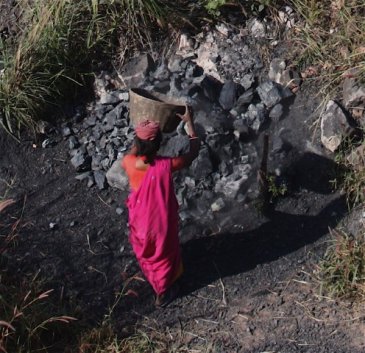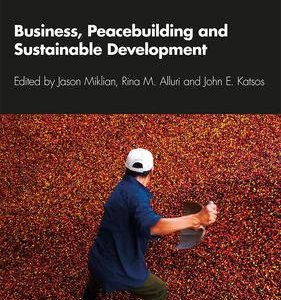The role of business in society is as contested as ever.

Coal Mine in Central India. Photo: Jason Miklian / PRIO
Business can help grow local communities, or they can exploit them. Economic growth can bring states together as it did the European Union, or it can help trigger conflict if the benefits are not distributed equitably, as we have seen in Myanmar, Sudan, and Sri Lanka, among others. Working in challenging environments across the developing world, firms can use either peace or conflict as a window to profit.
On the plus side, this can mean companies changing their operational strategies to better support the United Nations Sustainable Development Goals, or more engaged Corporate Social Responsibility action. On the negative side, firms can also use the same platforms to ‘peacewash’ their activities, arguing that their mere economic presence in conflict zones improves local communities when the reality leads to the opposite.
Today, the sheer power and scale of businesses in fragile parts of the world combined with a growing societal demand for them to be positive, socially aware actors have opened new potential paths for them to help build peace. Thus, the field of business and peace has emerged, exploring components of the assertion that businesses have a role to play in maintaining and promoting peace and societal development in conflict-affected or otherwise fragile parts of the world. It is becoming an increasingly essential space for scholars and practitioners alike to navigate, and is beginning to drive major global policy change.
Business, Peacebuilding and Sustainable Development
 This new book brings together 16 global experts on business and peace to help us not only know the state of the art in business and peace research, but also to help us look forward to better understand the consequences of these initiatives on the global sustainable development agenda. The contributors, from backgrounds including international relations, law, philosophy, development studies, political science, human rights and business (among others) decipher how different forms of corporate engagement in the pursuit of peace and development have different impacts and outcomes. This book is a multi-disciplinary and cross-disciplinary exploration of business and peace, and intends to be a guiding reference point for future work on the topic. It has three sections that contribute to this aim: theoretical advances, business and peace in practice, and emerging peace policy.
This new book brings together 16 global experts on business and peace to help us not only know the state of the art in business and peace research, but also to help us look forward to better understand the consequences of these initiatives on the global sustainable development agenda. The contributors, from backgrounds including international relations, law, philosophy, development studies, political science, human rights and business (among others) decipher how different forms of corporate engagement in the pursuit of peace and development have different impacts and outcomes. This book is a multi-disciplinary and cross-disciplinary exploration of business and peace, and intends to be a guiding reference point for future work on the topic. It has three sections that contribute to this aim: theoretical advances, business and peace in practice, and emerging peace policy.
It is the first book to compile the state-of-the-field in one place and is an essential guide for students, researchers, policy-makers and practitioners.
Two overarching questions that drive this book are:
- How can the private sector better deliver peace contributions in fragile, violent and/or conflict settings?
- And what are the deeper consequences of this agenda for businesses, governments, international institutions and not least local communities that are presumed to be the beneficiaries of such actions?
The book explores these questions through the study of relationships between political stability/fragility, ethical business activity and economic opportunity through research-supported good practices by business for sustainable peace.
We find that the space for interested businesses to participate in peace has never been greater. Multinational firms, investment houses, small and medium-enterprises and other private sector actors have a wealth of tools at hand to help build peace, supported by a wide swath of multilateral organizations. However, we also find that a frustratingly large proportion of these efforts remain stuck at the ‘ceremonial commitments’ stage: ventures that sound impressive on paper, but don’t carry the depth or local knowledge needed to make a measurable peace impact. Several contributors explore more deeply the ramifications of these conflicting trajectories upon theory and policy, in settings as diverse as El Salvador, Iraq, Colombia, Sri Lanka, and Norges Bank Investment Management (Norway’s Oil fund).
Further, business-related issues for international relations practitioners are explored, including management and policy frameworks in the context of the limitations for peace promotion by businesses in post-conflict zones. To show how businesses function as development actors, this book deciphers how different forms of corporate engagement in the pursuit of peace and development have different impacts and outcomes. In the process, we bridge the intersection of peace and sustainable development means for businesses in practice, and how international organizations like the United Nations are helping frame business action and opportunity in conflict-affected areas.
Before businesses take a deeper role in the most complicated and risky elements of sustainable development, we need to be able to better explain what works, why it works, and what effective business efforts for peace and development mean for the multilateral institutional frameworks.
This book aims to do just that.